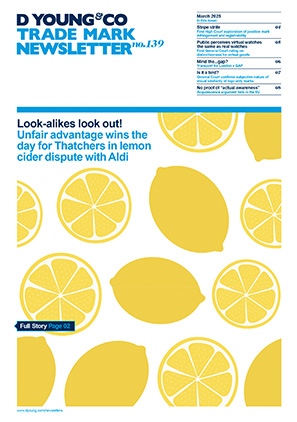VETEMENTS v VTMNS: a flagrant attempt to misappropriate a brand… and the cat walk
This transnational bad faith case concerned an attempt to legitimise infringing use in China, in proceedings before the UKIPO.
Background
VETEMENTS GROUP AG (VETEMENTS) is a Swiss based high-end contemporary fashion brand founded in 2014. VTMNS GROUP LIMITED (VTMNS) is a shell company created in the UK to legitimise the infringing use of VETEMENTS GROUP AG’s brand in Asia.
VTMNS filed oppositions against five UK applications filed by VETEMENTS.
VETEMENTS filed oppositions against four UK applications filed by VTMNS. It also filed an invalidity application against VTMNS’ UK registration.
All the contested trade marks comprised, or contained, the word “vetements”.
Pleadings
VETEMENTS and VTMNS both claimed that a likelihood of confusion would exist given the identity and/or similarity of the marks and similarity of the goods and services in contention. VETEMENTS further argued bad faith, identity, reputation, and passing off. It claimed:
- VTMNS’s applications were instruments of fraud, filed simply to enable VTMNS to authorise a Chinese entity to use the VETEMENTS mark in China without its consent;
- the contested marks were identical to its earlier VETEMENTS marks, and sought protection for identical goods;
- through investment and promotion its marks had developed a substantial reputation in the industry, such that the name “VETEMENTS” was associated with trusted, high-quality, and luxury goods and services. Consequently, use of the contested marks by VTMNS would take unfair advantage of the distinctive character and reputation of its marks, in addition to causing detriment due to the potential poor quality of goods offered by VTMNS; and
- it possessed goodwill in the sign “VETEMENTS” in relation to clothing, footwear and accessories, such that use of the contested marks by VTMNS would amount to passing off.
VETEMENTS’ pleadings in relation to bad faith were key to these proceedings. A successful finding would result in its actions succeeding in their entirety, and VTMNS’ own oppositions then falling away. Therefore, it was incumbent on VETEMENTS to submit corroborative evidence with a clear chronology of events, demonstrating use of its own marks in conjunction with VTMNS’ unauthorised use.
Both parties filed evidence and written submissions in support of their positions.
VETEMENTS sought permission to file additional evidence or cross examine VTMNS’ witness on the grounds that VTMNS’ defence contained inconsistencies and falsified documents.
VETEMENTS’ request for cross-examination was refused, however it was granted leave to file additional evidence addressing these points.
Bad faith
VETEMENTS’ evidence set out the history of the VETEMENTS brand, establishing that it was launched in 2014 by a collective of well-known and regarded fashion designers, in the EU. VETEMENTS’ UK specific evidence comprised a multitude of third party commentaries, advertising and marketing expenditure, turnover figures, certified retailers of its products, details of its own outlets, and some of its more prominent campaigns.
To provide a narrative of VTMNS’ conduct, and to corroborate its assertions of bad faith, VETEMENTS evidenced its use of the VETEMENTS brand in Asia, and argued VTMNS’ directors were individuals based in China who had used the VETEMENTS brand without authorisation or consent in China, and VTMNS’ applications to register the brand in the UK were motivated by a need to legitimise its Chinese operation. VETEMENTS’ evidence established that:
- In 2017 a Chinese company named Xiamen Vetements Brand Management (Xiamen) filed applications for various marks containing or comprising the word “VETEMENTS”. Xiamen also began producing and selling goods heavily inspired by VETEMENTS GROUP AG’s collections.
- In 2019 Xiamen opened retail outlets in China and Asia, featuring the mark “VETEMENTS”.
Distributors and mall owners sought confirmation that Xiamen was the legal owner and/or approved distributor of VETEMENTS goods in China. - In 2019 Xiamen created VTMNS GROUP LIMITED in the UK in an attempt to falsify a legitimate relationship with VETEMENTS GROUP AG.
- Xiamen and VTMNS GROUP LIMITED were economically linked.
- Xiamen produced copy-cat products branded without authorisation as VETEMENTS.
- VTMNS GROUP LIMITED had issued declarations authorising Chinese companies to sell VETEMENTS branded products.
- VETEMENTS GROUP AG’s use of the “VETEMENTS” marks outside of China predated VTMNS GROUP LIMITED’s use, supporting its allegation of plagiarism.
Accordingly, VETEMENTS alleged that VTMNS was part of a commercial operation, whereby its brand was knowingly taken and used in China in a calculated misrepresentation to deliberately take business away from VETEMENTS and preventing it from entering the Chinese market or expanding its business in China. Moreover, the applications filed in the UK by VTMNS GROUP LIMITED were made with a view to providing legitimate documents demonstrating ownership of the trade mark VETEMENTS, for the purpose of misappropriating the same mark in China.
VTMNS argued that it conceived the brand in 2013 and attempted to add credibility to its claim by stating that the brand was derived from the Chinese phrase “Wei Te Meng” meaning “unique, special, positive”. VTMNS asserted it began using the VETEMENTS brand in China in 2016, and included undated images of its launch event, commercial posters, retail outlets it owned, and third party coverage of its collection. VTMNS stated that it filed applications for VETEMENTS in the UK to protect its position in exploiting the mark in the UK.
The hearing officer held that VETEMENTS’ evidence was sufficient to establish that the alleged facts had occurred, and that VTMNS’ conduct in the UK amounted to bad faith. VTMNS’ evidence was inconsistent and contradictory. It was unable to explain how it devised the brand independently, nor prove use dating back to 2013. The hearing officer did not accept, given the distinctive nature of VETEMENTS’ mark, that VTMNS use of an identical mark on identical goods was mere coincidence.
Accordingly, VETEMENTS’ oppositions and invalidity application succeeded in their entirety, and VTMNS’ oppositions fell away.
In answer to a claim by VETEMENTS that the hearing officer consider all grounds claimed, the hearing officer continued.
Reputation
The hearing officer found that the reputation of VETEMENTS in combination with its distinctive nature would result in the relevant public making a mental link between the parties, even when different goods and services were involved. VETEMENTS’ claims were therefore successful in their entirety.
Identity and Confusion
VETEMENTS was only partially successful with respect to its oppositions under these grounds, as the hearing officer noted that some degree of similarity of goods and services was essential. In relation to goods found to be similar, she concluded that direct confusion would manifest.
Passing off
The hearing officer’s decision was brief, noting that whilst the test for misrepresentation is different to that for a likelihood of confusion, in this case it was doubtful whether the difference between the legal tests would produce a different outcome. Though it was accepted that VETEMENTS had moderate reputation in relation to some goods, its claims under passing off would not provide a better outcome with respect to dissimilar goods simply because those goods were different to those for which VETEMENTS had goodwill.
In short
These proceedings emphasise the importance of submitting corroborative and substantive evidence, with a clear narrative and chronology of events when alleging bad faith, even if such evidence is outside of the jurisdiction in question.
It is also important to scrutinise evidence for inconsistencies or contradictions and, address the same by rebuttal or cross-examination if it is of material importance to your case – guide the hearing officer!
Case details at a glance
Jurisdiction: United Kingdom
Decision level: UKIPO
Parties: Vetements Group AG v Vtmns Group Limited
Date: 29 December 2022
Citation: O/1140/22

